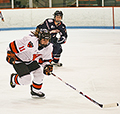
|
|
Vol. LXIII, No. 42
|
|
Wednesday, October 21, 2009
|
 (Photo by Emily Reeves)
EN GARDE! Fearsome duelers were among the highlights of Fairy Tale Boot Camp, a Cotsen Children’s Library event held last Saturday in Princeton University’s McCosh Courtyard. Children were taught new spells, learned how to identify mythical creatures, ran through an obstacle course, and got crowned.
|
Over 75 residents gathered in the Community Room at the Princeton Public Library on Saturday to brainstorm new possibilities for six sections of town during an event, “What If? Designing Our Town Together,” hosted by Princeton Future.
Manager and Engineer of the Princeton Sewer Operating Committee Bob Hough updated Borough officials on the state of municipal sewers at last week’s Council meeting. The cost of outfitting the meeting room with updated technology was also the source of debate, with Council deciding to table the resolution until a new, more targeted plan is proposed.
“Right now, the doors are wide open,” observed Chair Fern Spruill at Monday evening’s Minority Education Committee (MEC) Meeting, referring to opportunities to implement change. “But we need to have a team.”

In the midst of our everyday, often terse email exchanges, the art of conversation — real discussions with real people — is being practiced at “Noodle Talk,” a once-a-month gathering in the first floor Quiet Room of the Princeton Public Library.
“There’s a tendency to say ‘let’s start all over,’” observed New Jersey Conservation Foundation Executive Director Michele Byers at a conference last week on “Planning for New Jersey’s Next 20 Years.” Sponsored by the Princeton University Policy Research Institute for the Region, the event drew leaders from state and local government agencies, corporate representatives, and other policy makers to talk about “Where Are We Growing?”
Princeton University’s Class of 1943 Professor of African American Studies Cornel West spoke about his new memoir, Brother West: Living and Loving Out Loud, in McCosh Hall on Monday, with WNYC doing a live broadcast of the event. The packed auditorium held a rapt audience, which included second through sixth grade students from the Cornel West Academy of Excellence, who had come from Raleigh, North Carolina.

Heading into the ECAC hockey playoffs this past March, the Princeton University women’s hockey team was sizzling.
It has been one nailbiter after another this fall for the Princeton High boys’ soccer team this fall and last week’s game against Steinert proved to be no exception.
John Woodside likens progress in cross country to the formation of a glacier.
I wish I could play like Art Tatum’s right hand.Charlie Parker
On Art Tatum’s 100th birthday last Tuesday, October 13, Renée, an elephant at the Toledo, Ohio Zoo, painted a piano in honor of the city’s native son. Green and purple were the colors of choice. According to one report, pianos were also being painted all over town by human artists and left here and there so that anybody who felt the urge could sit down and play. Imagine — pianos on every street corner, in parks and shopping malls, as pros and amateurs alike take turns pounding the ivories. It makes some kind of sense, this idea of pianistic fantasia, a citywide musical delirium, to celebrate the man of whom Fats Waller once famously said, “I only play the piano, but tonight God is in the house.” Other pianists created moderately populous music. Tatum’s sound was a metropolis.
Except for Moliere’s brilliant comedies (1660-1673), the 250-year period from the time of Shakespeare in the early 1600s to the time of Henrik Ibsen and George Bernard Shaw in the late 1800s is seldom represented on the contemporary stage. Oliver Goldsmith’s She Stoops to Conquer, first performed in 1773 at Covent Garden, is a notable exception. Goldsmith’s masterpiece of “laughing comedy” nonetheless has prevailed through the centuries and promises a lively evening’s entertainment in its current lavish production at McCarter’s Matthews Theatre.
The Princeton Singers presented its first local concert of the 2009-2010 season on Friday night at Trinity Church in Princeton. Subtitled “(R)evolutions,” this program of eleven choral pieces sung by the 17-voice professional ensemble focused on works representing musical change and how music evolved to that point.